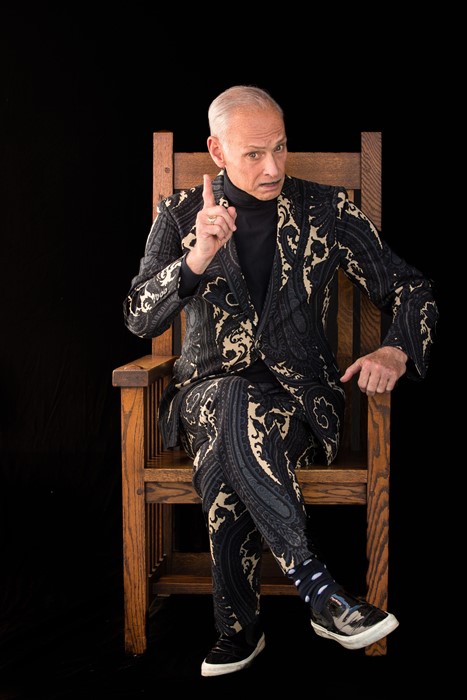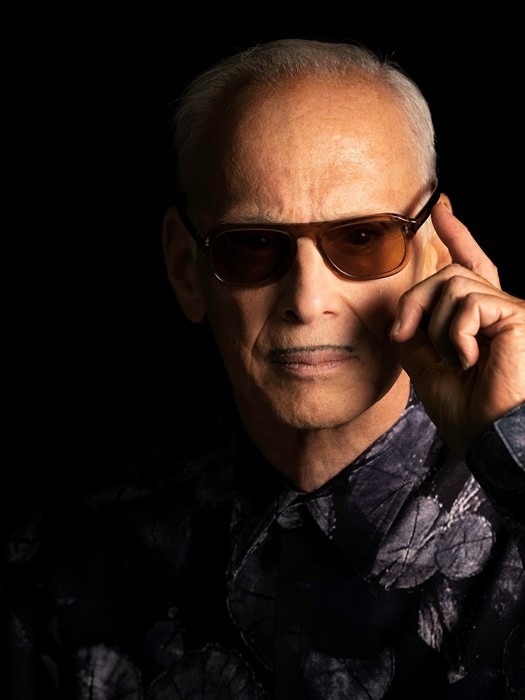The cult filmmaker continues to break boundaries with his debut novel and upcoming stand-up show – here, he explains why he only makes fun of the things he loves
John Waters has been called many things: the Prince of Puke, the People’s Pervert, the Pope of Trash. But, above all, he’s a storyteller. For nearly 60 years he’s offered a uniquely subversive form of social commentary by bulldozing through contemporary notions of American “good taste”. No other film director would devise a scene where an outrageous reprobate played by the greatest drag queen of all – Waters’ longtime collaborator Divine – eats an actual dog poo. But Waters did this in his 1972 cult classic Pink Flamingos, and never looked back.
By the time he made 1988’s big-hearted comedy Hairspray, Waters was inching ever closer to mainstream success. Hairspray has since been adapted into an enormously successful Broadway musical and glossy Hollywood blockbuster that put John Travolta in the dragged-up role originated by Divine. It’s safe to presume no Hollywood remake of Pink Flamingos is coming any time soon.
Now 76, Baltimore-based Waters continues to move with the times by sending them up in his own transgressive way. He’s recently published his debut novel Liarmouth, a gloriously sordid romp about an amoral femme fatale who makes her living by swiping suitcases from airports. The fact Waters gives his antiheroine an almost cutesy-sounding name – Marsha Sprinkle – only makes her more shocking.
He’s also bringing his latest spoken-word show, False Negative, to London's Barbican Hall for back-to-back Friday night shows on June 10. If it’s anything like this interview, you can expect observations that are pin-sharp, articulate, and playfully provocative at all times.

Nick Levine: What are your main targets in False Negative?
John Waters: When you say targets, that means that you think I’m attacking. Actually, I make fun of the things I love. It’s a little bit of an attack. It is [me] trying to understand the new rules of every outlaw society I’ve ever lived in since the moment I first rebelled, which is probably the first time I heard Elvis Presley sing. I’m also giving you a humorous take on how the world has completely changed since Covid: how humour has changed, fashion has changed, sex has changed, everything.
NL: Do you feel as though you can make fun of anything, as long as you have the right intentions?
JW: I think you have to be extra careful. I don’t do a lot of Holocaust jokes when I’m not Jewish. I don’t do a lot of African American jokes. But good humour has always walked that ledge of what you can get away with. I make fun of things I love, and I think that’s what has enabled me to get away with this for 50 years.
NL: You’ve also just published a brilliantly irreverent novel, Liarmouth. Do you think the line of what you can get away with is different in a spoken-word show? Can you get away with more because it’s in the moment?
JW: When you say anything out loud in a show, one reporter can write it down [and publish it] out of context. And that thing can be more remembered than a whole book. But they have the right to do that, so you have to watch what you say. There are lines in Liarmouth that certainly go over that edge of what you can get away with, but so far I think people are reading it in the exact same tone that I give everything. They get it. My fans have helped me all of these years because they are angry and they have a good sense of humour. They can laugh at themselves and the seriousness of their peers’ [political] battles.
“I make fun of things I love, and I think that’s what has enabled me to get away with this for 50 years” – John Waters
NL: Liarmouth's lead character, Marsha Sprinkle, is wonderfully appalling. Has she been living inside you for some time?
JW: Well, I think she would be able to get along with Serial Mom or Dawn Davenport [Divine’s character in Female Trouble]. I think that she would feel comfortable in my world, certainly. But she was a character that I totally made up as somebody who would be different from what political correctness is today, and different to anything my friends feel. I don’t know anyone that could hate their body as much as Marsha. Even defecation infuriates her because she didn’t get to think it up. She tries to kill her need to defecate by only eating crackers so she can just shoot out little pellets. I know what she means; I wish I didn’t have to do that every day, too.
NL: The book also features a character who performs plastic surgery on pets, which feels like the kind of ridiculous thing that actually could happen.
JW: I bet that is already is happening in Los Angeles or Monaco, where people would want their dogs to look rich. I look at some people [who’ve had work done] and think: “Did they want to look like that?” And my friend Pat Moran says: “No, they want to show they’re rich by proving they can afford to have a facelift.” It’s the opposite of what I’d want if I ever had a facelift. I’d go to Switzerland where it would be underplayed.
NL: I read an interview with a British celebrity who said she doesn’t have work done because it makes her look younger, but because it makes her look fashionable. For her, it’s a status symbol.
JW: For me, it’s the opposite. Though I tell ya, Deborah Harry had it and she talks about it all the time and she looks great. She is a great star, so I’m not saying everybody shouldn’t do it. But I think I probably got asked to appear in the new Calvin Klein campaign because I do look old. I talk in my show about why you shouldn’t get plastic surgery, and bring up a lot of celebrities that never would have had a career if they’d gotten it.
“I think every drag queen now has been influenced by Divine: almost none of them are square like they were when we were growing up. Back then, they all wanted to be Miss America” – John Waters
NL: Drag has changed so much in the last 15 years: partly because of RuPaul's Drag Race, and partly because of social media. Do you think it can still be genuinely subversive?
JW: Well, I think it is more accepted than it’s ever been. And I give RuPaul great credit for that. I think every drag queen now has been influenced by Divine: almost none of them are square like they were when we were growing up. Back then, they all wanted to be Miss America. Now they all have an attitude, they have an act, and they have a certain rage in them. To me, drag kings do that better sometimes now, because they can sometimes pass even better [as the gender they’re sending up] and that makes them scarier to people. And so I think there still is a way for drag to surprise people.
NL: Do you ever think of where Divine might slot in now, or is that almost too weird?
JW: He would be on the show as a judge and he would be a man. Divine was not trans: he had no desire to be a woman, though he would be for the [trans] movement and the freedom of it. But Divine was an actor; towards the end [of his life] he wore expensive men’s clothes. And one thing Divine was really struggling on, that RuPaul has figured out more than anyone, was to have a great look as a man, too. That’s really important, I think. If you’re going to be a celebrity drag queen, you have to have both looks down. But Divine changed things [back in the day] because he would go to drag concerts with a chainsaw and scars on his face. Other drag queens hated him because they knew he was making fun of drag, but in a new way, and especially because he was overweight. No other drag queen was like that at the time.
NL: We have this expression in the UK: national treasure. At this stage in your career, do you ever feel like a kind of alternative national treasure?
JW: National treasure? That expression makes me think of April Ashley. Well, I would never brag like that. But when people come up to me and say I saved their lives or made them feel good about themselves when they were younger, I’m amazed. And I’m really honoured that I did that. But I just try not to feel too much like a twisted Mother Teresa.
John Waters will be performing his all-new, stand-up comedy monologue False Negative at London’s Barbican Hall on June 10. His novel Liarmouth is out now.
